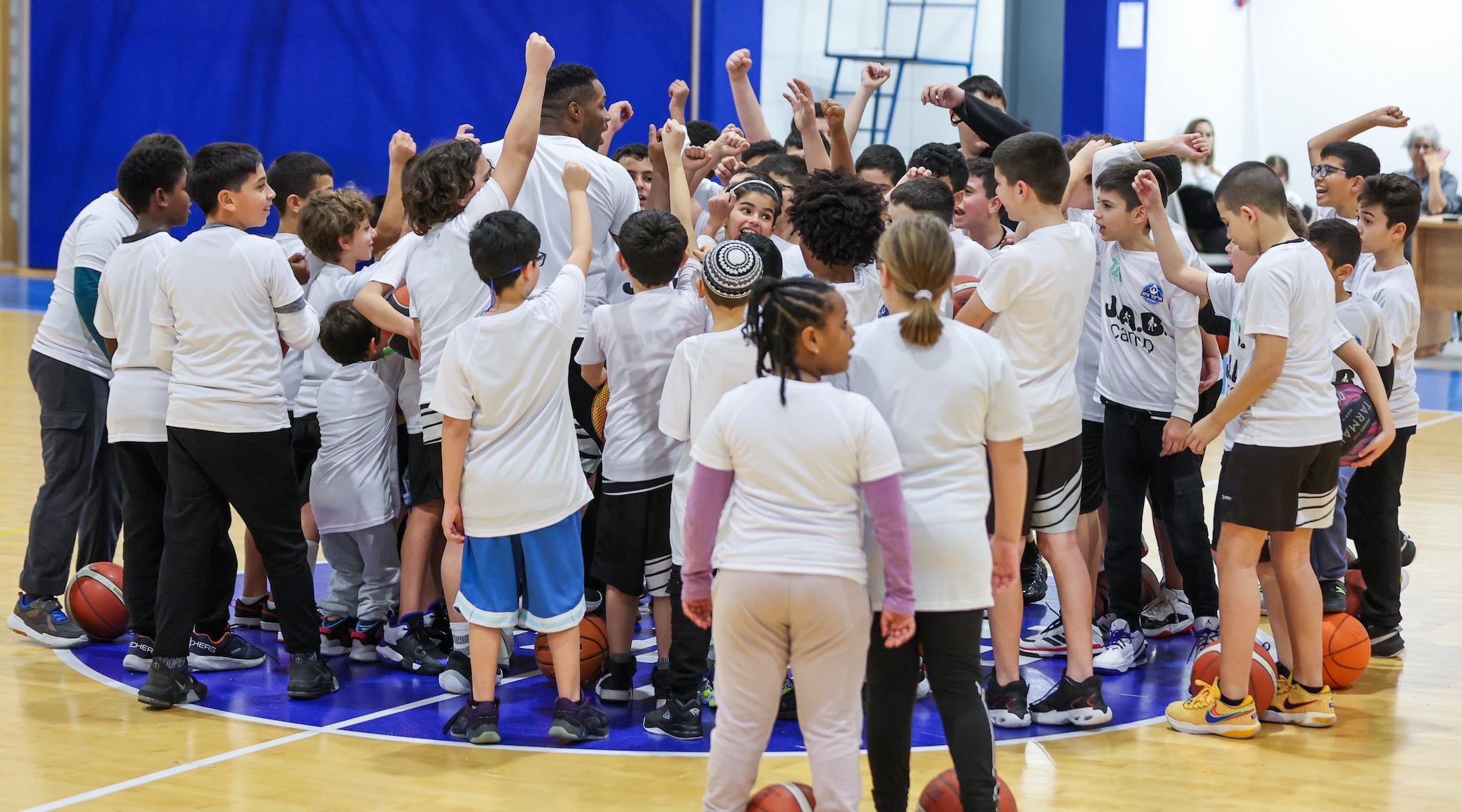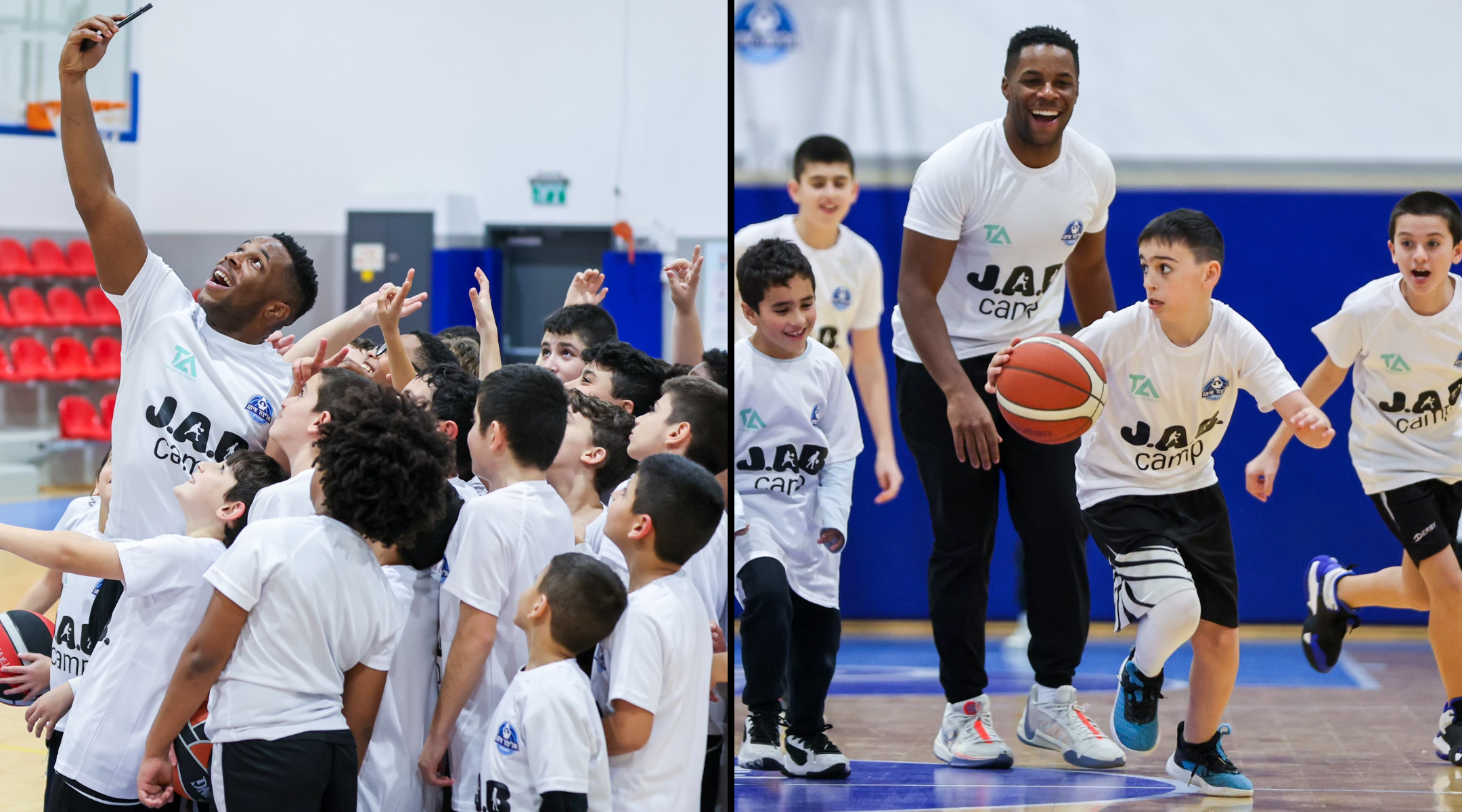Jared Armstrong’s season was supposed to start on Oct. 7. Now he’s using basketball to help Israeli children escape the realities of war.
Armstrong, who plays professionally in Israel’s second-tier basketball league, is running free clinics for children in Ashkelon

Jared Armstrong, center, is running free basketball clinics for children in Ashkelon, Israel. (Courtesy of Armstrong)
(JTA) — Last summer, Jared Armstrong traveled from his adopted home of Israel back to the United States to confront a problem — running basketball clinics across the country in a bid to improve Black-Jewish relations.
Now, following Hamas’ Oct. 7 invasion of Israel, the professional basketball player is bringing his clinics to the southern coastal city of Ashkelon, where he lives, aiming to provide kids with a diversion and a chance to have fun as the war continues to rage just miles away in Gaza.
He also hopes to give Israeli children evacuated from Gaza border communities a chance to get on the court.
“I felt people weren’t really focusing on helping kids and inspiring kids,” Armstrong told the Jewish Telegraphic Agency about the aftermath of Oct. 7. “Mostly all the kids play basketball. It was a way that I can help them escape from the world, from what’s going on.”
Armstrong, 27, is a point guard for Elitzur Ironi Ashkelon, a team in Liga Leumit, or National League, Israeli basketball’s second tier. On Oct. 6, the team played its final preseason game and was prepared to begin the season.
But the next morning, Armstrong woke up to the sound of rockets, one of which landed right in front of his building. Amid the rocket fire, thousands of Hamas terrorists were streaming into Israel. They killed about 1,200 Israelis and took more than 250 hostages.
“I remember it like it was yesterday,” Armstrong told the Jewish Telegraphic Agency. “I’m looking literally outside my window where the rocket landed, right in front of my apartment.”
The basketball season was suspended, and Armstrong returned to the United States, where he stayed through Thanksgiving. He returned to Israel when the Culture and Sport Ministry announced that the season would resume. Ashkelon played its first game Dec. 1.
“Even though people are trying to live normal lives, it’s been different. You can just feel it through the energy,” said Armstrong, whose battle for legal residency in Israel was hard-fought.
Armstrong, who has averaged 9.2 points in just under 20 minutes per game this season, said fans are still attending the team’s games. With a 9-5 record, Ashkelon is in second place in the league.
“You can also feel the Israeli spirit of people fighting and wanting to live their regular lives and trying to get back to normal,” added Armstrong, who was raised Jewish in Philadelphia and formally converted when he decided to move to Israel. “But I feel like you won’t completely feel that probably until the war’s over and all the hostages are back.”
Armstrong hopes his clinics can aid the return to normalcy. Last year, he founded JAB Camps (short for “Jared Armstrong Basketball”) and held camps and clinics in Philadelphia and Los Angeles. In addition to playing together, Black and Jewish kids heard from guest speakers who taught them about antisemitism, racism and topics including nutrition and financial literacy.

Armstrong said he hopes his clinics will “create a positive environment that can help [kids] escape from the world and use basketball as a sanctuary.” (Courtesy of Armstrong)
Now, he’s hoping the model will work in Ashkelon. Armstrong held a free clinic last month for more than 60 children there and is preparing for his next event on Monday. He will run clinics monthly through the end of the basketball season in June, when he plans to return to Philadelphia for the offseason and run a multiday camp.
“I felt this initiative was something that could help kids on and off the court, not only physically but emotionally, spiritually, and just create a positive environment that can help them escape from the world and use basketball as a sanctuary, which it has always been for me,” he said.
Along with providing an escape from the war, in the future Armstrong hopes his camps can promote Arab-Jewish relations, similar to their goal in the United States.
He is also working on creating a basketball league for families who evacuated their homes and relocated to Tel Aviv. Many child evacuees attend schools that don’t offer extracurricular programming.
“My goal, if it’s able to start, is try to create an environment where kids can have an outlet that they can remember for the rest of their lives,” Armstrong said. “When the war is over and they start going back to living normal, they can look down at the T-shirt [they received from the camp] and say, ‘Damn, I went to JAB Camp’s basketball league.’ And it could bring a memory and a positive smile to their face.”
This article originally appeared on JTA.org.
A message from our Publisher & CEO Rachel Fishman Feddersen

I hope you appreciated this article. Before you go, I’d like to ask you to please support the Forward’s award-winning, nonprofit journalism so that we can be prepared for whatever news 2025 brings.
At a time when other newsrooms are closing or cutting back, the Forward has removed its paywall and invested additional resources to report on the ground from Israel and around the U.S. on the impact of the war, rising antisemitism and polarized discourse.
Readers like you make it all possible. Support our work by becoming a Forward Member and connect with our journalism and your community.
— Rachel Fishman Feddersen, Publisher and CEO

























